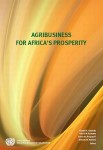The study, titled “Agribusiness for Africa's Prosperity,” identifies and analyzes seven development pillars for agribusiness development, outlines an agenda for action focusing on visions, policies, strategies and institutions for Africa's agribusiness development, and considers the impact of climate change on agro-industry in sub-Saharan Africa.
 13 May 2011: The UN Industrial Development Organization (UNIDO) has published a study, titled “Agribusiness for Africa’s Prosperity,” which focuses on the opportunities and challenges for African agribusiness and agro-industries.
13 May 2011: The UN Industrial Development Organization (UNIDO) has published a study, titled “Agribusiness for Africa’s Prosperity,” which focuses on the opportunities and challenges for African agribusiness and agro-industries.
The study outlines the opportunities for diversified growth in Africa, and assesses the existing and potential sources of demand growth for agribusiness development on the continent. It includes case studies of countries in their development of agribusiness and agro-industries, to identify, inter alia, innovative financing methods and how they have responded to various challenges. It also considers, among other things, the impact of climate change on agro-industry in sub-Saharan Africa.
A key part of the study is the identification and analysis of the seven development pillars for agribusiness development, which are the actions needed to transform subsistence agriculture into productive agribusiness, as follows: enhancing agricultural productivity; upgrading value chains; exploiting local, regional and international demand; strengthening technological effort and innovation capabilities; promoting effective and innovative financing; stimulating private participation; and improving infrastructure and energy access.
Finally, it outlines an agenda for action and a framework to guide the efforts of stakeholders, with a key focus on visions, policies, strategies and institutions for Africa’s agribusiness development, together with the way forward towards converting plans into action. [UNIDO Press Release] [Publication: Agribusiness for Africa’s Prosperity]